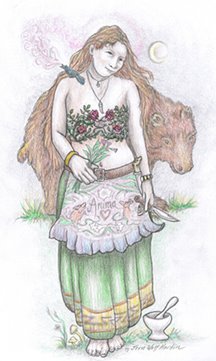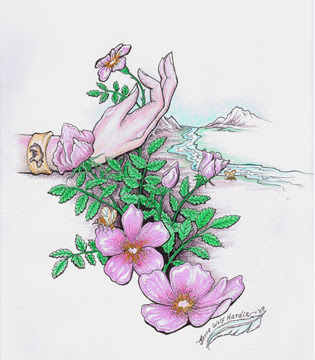 Not an exhaustive list of course, but a small number of the plants I'm most likely to use in any given situation. Don't forget to try Magnesium and other trace minerals for any seemingly random emotional problems.
Not an exhaustive list of course, but a small number of the plants I'm most likely to use in any given situation. Don't forget to try Magnesium and other trace minerals for any seemingly random emotional problems.
These kind of plants often act very differently according to the individual, and so it's important to proceed somewhat slowly and for the person to try to be self-aware and open when working with the plants, so as to get the most out of the experience.
And while plants can profoundly affect our process and our ability to be with our emotions, it's up to us to work through our issues, and to have a fierce love for our own spirits so that we can mindfully and gladly journey through the pain and bliss, joy and terror, great loss and immense gifting that is our lives.
Evening Primrose - Great for food based anxiety in those recovering from eating disorders as well as depression arising from digestive problems (David Winston). I also use Evening Primrose hormonally related anxiety and depression, it's a very uplifting and calming plant without turning your mind to mush. I also use it in general anxiety and depression accompanied by nervousness and stress. Perhaps one of the most overlooked emotional modulators out there.
Monkeyflower - Depression with fear, especially of pain and repressed sexuality. Great for those who've forgotten how to play like little kids, like SJW, I believe it has the ability to help adjust solar energies in the individual.
Blisswort (Skullcap) - Probably the nervine I use the most for myself. It has a special affinity for the nerves and so is especially good for those who feel like anything that touches their skin is electrocuting them or that they're going to lose their mind from the noise when the stereo is barely turned on. Great for those recovering from meth and addictions to other uppers. Skullcap is a tonic and can slowly but surely rebuild fried nerves.
Peach - Calming, cooling moistening. An ideal calming agent for those dried out Pitta people who are so hot bothered they can't even eat. Nice for stressed out, nauseous, insomniac mothers to be. Small doses are best, just a few drops really.
Rose - For anyone and everyone who needs to calm down and smell the flowers a bit more. Especially appropriate for those who have depression from a lack of self-love and anxiety from sexual or romantic betrayal/violence. Great for balancing fierceness and vulnerability, where those aspects are out of whack. Very useful in cases of hot, lingering forms of rotating depression/fatigue and severe anxiety with total lack of libido or fear of sex. For those who are burning themselves out from lack of love and compassion. Heart opening and centering for the whole body. Can you tell I use this plant a lot, it is, in fact, the flower that gave me back my heart.
Nettle - An adaptogen for the adrenals (Henriette Kress). Great for hypothyroid, chronic fatigue and brain fog. I haven't tried it in depression per se, but have now used in on myself and a couple other cases where there's overwhelming tiredness (and therefor, often a feeling of bodily depression) from adrenal burnout.
Sage - More than a nervine, this is a tonic for rebuilding the nervous system where there has been deep and longlasting trauma. It helps to restore the integrity of the feeling senses. Specifically useful where there's shaking and tremors, anxiety with overwhelming fear, and profound burnout.
Western Mugwort - For those who have lost their trust in the natural order of things, who lack a sense of deep security. It can give a calm, "mothered" feeling to those who need it most. It's an intense plant and can give some people nightmares. A sacred plant of many cultures, it's best to ease into a relationship with Mugwort, and to be very conscious when working with it. Not everyone experiences the nervine/spiritual effects, some people just get the digestive and liver protective elements.
Monarda - A somewhat euphoric relaxant, stimulating to the circulation. Opens the heart to more fully experience the beauty of life (Matt Wood). Combines well with Rosemary and/or Sage.
Sweet Clover - A nice gentle relaxer with an affinity for moving stuck energy and patterns.
Lavender - One of my students calls Lavender tincture "a hug in a bottle", this is so true! Lovely anxiety, insomnia and the depression that comes from constant worry.
Rosemary - Great for stagnant, cold depression in people whose digestion is slow and tense, subject to headaches and brain fog and a tendency towards low blood pressure and chronic fatigue.
Motherwort - A really nice relaxant nervine for the fried and frazzled with a tendency to palpitations and other heart stress. Good for those who's anxiety wears them down into depression.
Wild Peony Root - Antispasmodic, calmative and an all over lovely plant, especially for those with an overactive reproductive system (short cycles) and useful for ovarian cyst pain too.
Elder Flower - An emotional restorative after immense grief, and a gentle nervine for those who need a bit more of Faery in their vision of life.
California/Mexican Poppy - A great general nervine for nearly anything, and it blends well with most other nervine type herbs too. I specifically like it for depression and anxiety from pain. Great combined with Blisswort and Sage for deep nerve trauma. The Poppy is about taking a break from whatever is torturing you. Herbalist Mimi Kamp has a story about being really really stressed out, taking Cali. Poppy and totally forgetting what she was stressed out about. And when she did remember, she didn't care anymore. That is the nature of the Poppies. This particular subspecies isn't addictive and while it is comforting doesn't give the big oblivion some of its cousins do.
Corydalis/Golden Smoke - For hysteria, grief and fear so big that you can't step away and even see what's going on. You can only feel the terror and pain of it. This plant helps us calm down and pull away enough to see the bigger picture. It has its uses in severe chronic pain, but I usually prefer it in acute emotional issues. Very similar to Bleeding Heart (a close relative), Corydalis should be used with care and in fairly small doses (no more than a tsp of tincture at a time) and I use only a few drops at most normally.
Violet - Well, I haven't tried the tincture for depression or anxiety, but just living near this plant is enough to make me joyful!
Thursday, August 9, 2007
A Few of my Favorite Calming & Uplifting Herbs
Posted by
Oakmoss Changeling
at
12:27 PM
![]()
Labels: Medicine Woman Materia Medica, Therapeutics and Nutrition
Subscribe to:
Post Comments (Atom)
The Medicine Woman is glad you came...
All writings & posts (c)2007 Kiva Rose
All artwork & photographs (c) 2007 Jesse Wolf Hardin












3 comments:
hello sister ~ your new design is beeautifull!! So cooling and calming!
hugs and blessings - ananda
Hi Kiva,
I just wanted to say that I love your blog. Do you think that I could possibly find plants in my area (Nova Scotia, Canada) that would help with depression, anxiety, and PTSD syptoms? My meds just don't seem to help me as much as I thought they would.
I can't wait to take the sacred heart course. (Yeah it's me. Heehee) PhobiaForever@Yahoo.ca
Blessings to you and everyone at the anima center,
~Teri~ xxxooo
Hello,
you have written about many flowers that grow in your area and can be used to modify and treat disturbed emotions.
I am interested in such herbs, as you will see on my website www.farawaysister.com where I have written about Bach flowers ( under Behaviour disorders ).
You would be surprised to know that though I live in India, I use Evening primrose and other flower extracts which you have mentioned, in my medical practice!
I would love to hear from you,
Dr. Joshi : farawaysister@gmail.com
Post a Comment